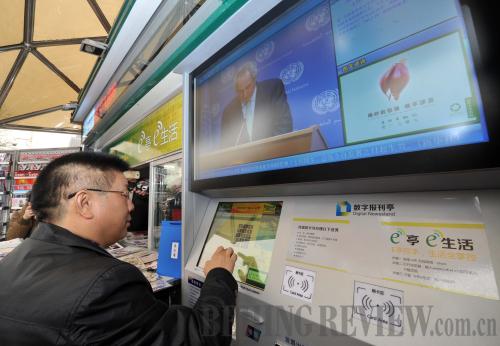|
 |
|
SMART NEWS: On March 19, Beijing Post's Vice General Manager Qiu Huaiyuan illustrates the functions of a newly installed smart newsstand, including news video display, weather broadcasts and more (GONG LEI) |
Power List
China's Central Government now has 1,235 administrative approval items in total, after last years' extensive cull, according to a list published on March 17.
The list, available on the State Commission Office for Public Sector Reform's website (Scopsr.gov.cn), lists the items that come under 60 central government departments. For each item, the list spells out the responsible authority, approval object and its legal basis.
Publication of the list is a major step in the transformation of government functions, said a statement by the State Council office in charge of the system. No department is authorized to create new approval items and the market should be allowed to do anything not specifically prohibited by law, the statement said.
The public have been asked for feedback on further reform of approvals via the website, by phone or e-mail.
Terrorism Denounced
China on March 19 reiterated its stance on fighting against the East Turkistan Islamic Movement (ETIM), a terrorist group that voiced support for a deadly terrorist attack in a railway station in southwest China on March 1.
ETIM has released a video online and expressed support for the attack in Kunming, capital of Yunnan Province, which killed 29 and injured another 143.
"The video exposed the terrorist nature of the ETIM," Foreign Ministry spokesman Hong Lei said at a daily news briefing. He said that fighting against the ETIM is a key component of the international fight against terrorism.
Hong called on the international community to fully recognize the terrorist nature of the "East Turkistan" forces, as represented by the ETIM, and the damage they have caused, and to support China's anti-terrorism stance.
The ETIM, listed by the UN Security Council as a terrorist group, claimed responsibility for the Tiananmen Square attack last October in Beijing in which five people were killed and 40 others injured.
Protecting Petitioners
China's new rules for better management of petitions have prohibited putting petitioners under any form of confinement.
"Various political and legal organs should further regulate the handling of lawsuit-related petitions, resolutely avoiding blocking the people from normal petitioning by any means," said a circular released on March 19 by the general offices of the Communist Party of China Central Committee and the State Council.
Petitioning, also known as "letters and calls," is the administrative system for hearing public complaints and grievances.
Petitioners generally see injustice in land acquisition, social security, education, healthcare or environmental protection. They can take their grievances to a higher level if they fail to get satisfactory feedback from local petition offices, but officials often prevent them from raising such cases with their superiors.
The circular stresses that illegal or indirect confinement of petitioners is strictly prohibited, and that leading officials of related law enforcement organs are responsible for receiving petitioners and reading their letters.
| 